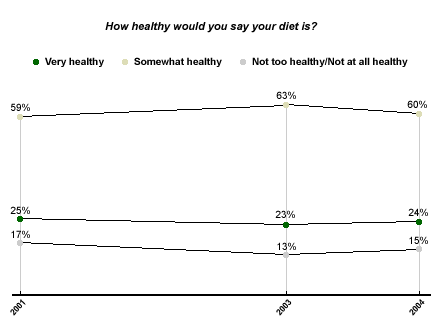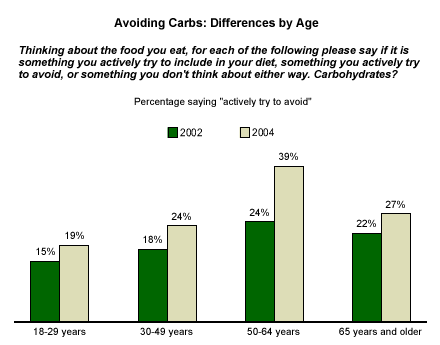Low-carbohydrate diets such as Atkins and the South Beach Diet made the leap from marginal fad to full-blown trend last year, as millions of people seized on a possible strategy for curbing America's much-lamented "obesity epidemic." ACNielsen documented significantly reduced demand in 2003 for a number of high-carb foods such as bread and pasta, and a rise in demand for meat and other high-protein foods. The food industry has been scrambling to react; consumers now have low-carb options for everything from pretzels to peanut butter. Soft drinks are one of the most recent entrants; Coke's low-carb, mid-calorie offering debuted in May, and Pepsi's version followed in June.
Industry analysts are watching closely for signs of whether the low-carb trend will have legs. Stephanie Childs, manager of public policy communications at the Grocery Manufacturers of America, equates the current hype about specific low-carb diets, such as Atkins or the South Beach Diet, will die down -- but she feels the trend will have a more limited long-term effect on the food industry. "I think low-carb products are going to be around for awhile," she says. "But I think they're going to become a similar part of your grocery experience as low-fat, low-sodium, and low-sugar foods -- they're going to be another choice available to those consumers who want it."
Data from Gallup's 2004 Consumption poll* suggest the surrounding hype may fade sooner than many expect.
Are Low-Carb Diets Healthier?
Overall, the number of Americans who say they are actively avoiding carbohydrate-rich foods has risen from 20% to 27% in the last two years (see "More Americans Avoiding ‘Carbs' in Their Diets" in Related Items). But despite this shift in eating patterns, Americans' assessments of how healthy their diets are have not budged. This year, 24% of Americans rate their diet as "very healthy" -- virtually the same as the 25% who did so in 2001 and the 23% in 2003.

Even among just the 50- to 64-year-old age group, which experienced the biggest rise over the last two years in the percentage saying they actively avoid carbs, from 24% in 2002 to 39% in 2004, ratings of their own diets have shifted only slightly since 2001 (31% now rate their diets as very healthy, compared with 25% in 2001). Among those who currently say they actively avoid carbs, 27% describe their overall diet as very healthy, while 60% say it is "somewhat" healthy. Among people who say they actively try to include carbs, the numbers are similar: 26% very healthy, 61% somewhat healthy.
Furthermore, Americans still maintain that a low-fat diet is healthier than a low-carb diet; the percentage of Americans saying they feel it's more beneficial to avoid fats has held steady at about two-thirds, while the percentage who say it's better to avoid carbs is stable at slightly more than one-fifth.
If Americans fail to identify low-carb diets with overall robust health, they're unlikely to stick with them over the long haul. In May, an ACNielsen Homescan panel survey found that though 17% of households report that a member is currently on a low-carb diet, 19% say that someone in their household has "tried and quit" such a regimen.
And it remains questionable whether Atkins and other low-carb regimens will be able to sustain the impression that they are the answer to America's obesity crisis. On the whole, Americans' perceptions of their own personal weight situations have not improved at all over the past several years. So far, low-carb diets don't appear to have changed poll results on weight for the better. Among those who say they actively try to avoid carbs, 52% currently describe their personal weight situation as "very" or "somewhat" overweight; 45% of carb-avoiders described their weight situation that way in 2002.
Little Interest Among Young Adults
The low-carb craze doesn't seem to be grabbing younger adults as much as older adults, which may cut into its staying power. The 50- to 64-year-old group has experienced the highest increase by far in the percentage of people avoiding carbs; among those 49 and younger, the number has risen only about five percentage points.

Bottom Line
Atkins and other low-carb diets have already made a far bigger impact on Americans' dietary habits than almost anyone could have predicted five years ago, and the fact that they've raised Americans' awareness of the connection between excessive carbohydrate intake and weight gain may well have long-term benefits. But given the findings that many Americans find such diets difficult to sustain -- and that they are not necessarily associated with a healthier overall diet -- their appeal may be limited in the long term.
*These results are based on telephone interviews with a randomly selected national sample of 1,005 adults, aged 18 and older, conducted July 8-11, 2004. For results based on this sample, one can say with 95% confidence that the maximum error attributable to sampling and other random effects is ±3 percentage points. In addition to sampling error, question wording and practical difficulties in conducting surveys can introduce error or bias into the findings of public opinion polls.
